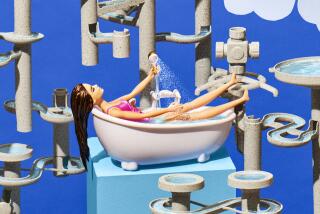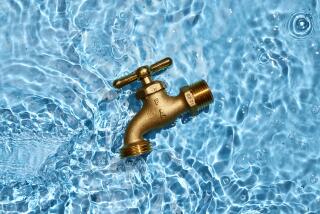Consider What’s on Tap Away From Home
- Share via
Think before you drink the water, especially in developing countries, and you boost the chances of returning home healthy. Dirty water can lead to traveler’s diarrhea, giardiasis (infection of the small intestine) and a host of other diseases.
The best plan? Maintain a healthy skepticism about the quality of drinking water as you travel. And before departing, try to find out the quality of the water supply at your destination and if preventive measures are necessary. Know when it’s best to bypass water and choose other beverages. Just in case, learn the best disinfection techniques.
“Places with poor sanitation services are more likely to have poor drinking water,” said Eric Rodenburg of the World Resources Institute, an environmental policy research organization in Washington, D.C. Small cities, towns and rural areas are more likely to have unpure water than major cities.
Those generalities aside, the danger of water-borne disease is widespread, said Dr. James Runnels, who heads the Baylor Travel Medicine Service at Baylor College of Medicine, Houston. “Southeast Asia, South America, Central America and parts of Africa all pose significant risk of water-borne illness,” he said. “The United States, Canada, Western Europe and Australia, by and large, are considered as safe as possible.”
*
Pack an anti-diarrheal medicine, suggested Runnels, and ask your doctor if taking along prescription antibiotics is advisable, in case of contact with contaminated drinking water. Depending on destination, the doctor may suggest a preventive dose of immune globulin (formerly called gamma globulin) to protect against hepatitis A, which can be contracted through contaminated water, ice or foods. (Although not yet available, two U.S. companies have developed hepatitis A vaccines and are currently awaiting federal approval to market.) Additional information on food and water precautions during foreign travel is available by telephone or fax from the federal Centers for Disease Control and Prevention’s international traveler’s hot line, (404) 332-4559.
If specific information about water at a destination isn’t available, consider the drinking water unsafe, said Fred Reiff, regional adviser on water quality for the World Health Organization/Pan American Health Organization in Washington. Reiff said he never travels without a water test kit and disinfection supplies. If water purity is questionable, choose hot coffee, hot tea, beer, wine or canned or bottled carbonated beverages.
Drinking directly from a can or bottle is safer than transferring the beverage to a glass that could be contaminated, according to the CDC. Be sure to dry wet cans or bottles before drinking and to wipe clean the area of the container that will come in contact with the mouth. Don’t brush teeth with tap water if there is any chance it is contaminated.
While this is only practical for travelers staying in suites or, perhaps, rented homes or apartments, CDC experts consider boiling to be the most reliable method for making water safe for drinking. Bring the water to a vigorous boil and continue boiling for 10 minutes. Allow it to cool to room temperature and do not add ice, which could also be contaminated. Store the water in a covered and sterilized container to avoid recontamination. Boil water the evening before you need it, Runnels suggested, and then cover it overnight so it will cool and be ready for drinking the next morning. To improve the taste, add a pinch of salt to each quart.
Chemical disinfection is another alternative. CDC recommends using 2% tincture of iodine or disinfection tablets--both sold at sporting goods stores. Use five drops of tincture per quart or liter, if water is clear, and 10 drops if water is cold or cloudy. To treat with the tablets, follow manufacturer’s instructions, doubling the number of tablets if the water is cloudy. Increasing the recommended disinfection time is another way to increase purity.
*
Another option--portable water filtration devices--are promoted by manufacturers as the easy way to purify water. But even though some kill and remove many microorganisms, CDC experts do not recommend this method, noting a lack of what they consider to be valid scientific evidence in support of such claims. The systems work better on filtering bacteria than viruses, Runnels said. “Even the best portable water filter devices are not adequate to filter viruses,” he said. While the devices may be good for a camper concerned only about filtering out the parasite responsible for giardiasis infection, the filters should not be relied upon to filter out the viruses that cause such diseases as hepatitis.
When should a doctor be consulted? “If you feel severely ill, pass any blood or throw up blood, have significant nausea or vomiting or symptoms last longer than three days, get medical help,” Runnels said.
The Healthy Traveler appears the second and fourth week of every month.
More to Read
Sign up for The Wild
We’ll help you find the best places to hike, bike and run, as well as the perfect silent spots for meditation and yoga.
You may occasionally receive promotional content from the Los Angeles Times.






